 Petzlover
Petzlover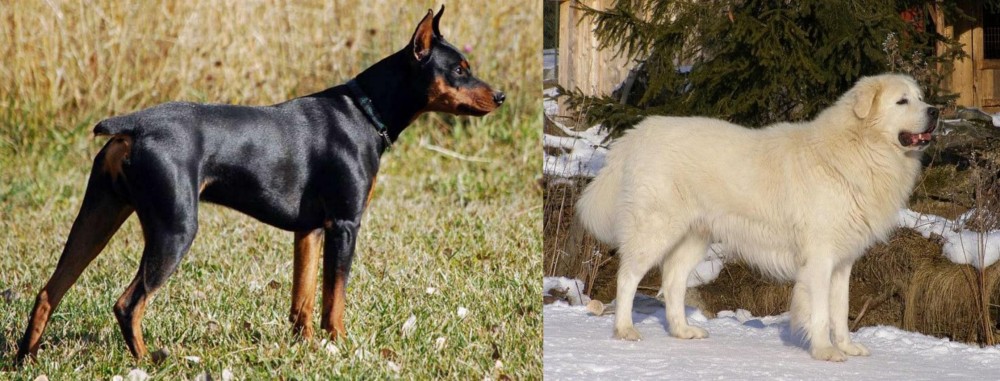 German Pinscher is originated from Germany but Slovak Cuvac is originated from Slovakia. German Pinscher may grow 20 cm / 7 inches shorter than Slovak Cuvac. German Pinscher may weigh 24 kg / 52 pounds lesser than Slovak Cuvac. Both German Pinscher and Slovak Cuvac has same life span. Both German Pinscher and Slovak Cuvac has same litter size. German Pinscher requires Low Maintenance. But Slovak Cuvac requires Moderate Maintenance
German Pinscher is originated from Germany but Slovak Cuvac is originated from Slovakia. German Pinscher may grow 20 cm / 7 inches shorter than Slovak Cuvac. German Pinscher may weigh 24 kg / 52 pounds lesser than Slovak Cuvac. Both German Pinscher and Slovak Cuvac has same life span. Both German Pinscher and Slovak Cuvac has same litter size. German Pinscher requires Low Maintenance. But Slovak Cuvac requires Moderate Maintenance
 The German Pinscher or Deutscher Pinscher originates in Germany. When you look at the dog you can see the the Doberman, the Rottweiler, Schnauzer, Affenpinscher and Miniature Pinscher have all played a role in the dog’s development.
The German Pinscher or Deutscher Pinscher originates in Germany. When you look at the dog you can see the the Doberman, the Rottweiler, Schnauzer, Affenpinscher and Miniature Pinscher have all played a role in the dog’s development.
There have been drawings of the German Pinscher which have been seen in dog books as early as 1884 and some drawings even earlier than this date. The dogs have descended from early European herding breeds.
The German Pinscher came to breeders of the United States in the 1980s, and the German Pinscher Club of America was started by German Pinscher fanciers, with the dog gaining acceptance by the Canadian Kennel Club in 2000.
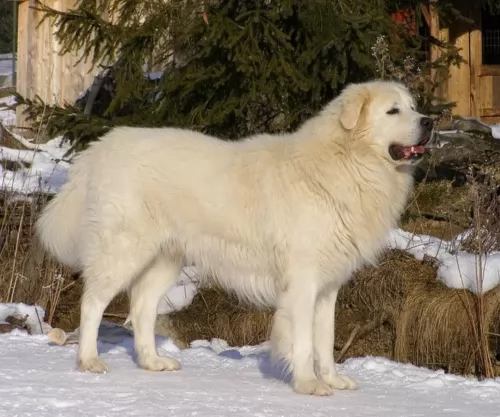 Looking quite a bit like the Pyrenean Mountain Dog, the Slovak Cuvac is a large dog that has served as a guard dog. The Slovensky Cuvac is still used on sheep farms as he isn’t afraid of wolves and bears and will take them on if needs be.
Looking quite a bit like the Pyrenean Mountain Dog, the Slovak Cuvac is a large dog that has served as a guard dog. The Slovensky Cuvac is still used on sheep farms as he isn’t afraid of wolves and bears and will take them on if needs be.
Records of this dog have been kept since the 17th century already, and when the breed started dying out, a certain Dr Antonin Hruza put in efforts to revive the dog.
The registered breeding of the Slovensky Cuvac was established in Czechoslovakia and a club for the dog was established in 1933. A written standard was established in 1964. The dog is not recognized by the Fédération Cynologique Internationale.
 The German Pinscher is a medium sized dog with a square build, looking very much like the Doberman Pinscher we know so well, but slightly smaller. Dogs and bitches stand roughly 45 to 50cm at the withers and the dog weighs between 14 to 20kg.
The German Pinscher is a medium sized dog with a square build, looking very much like the Doberman Pinscher we know so well, but slightly smaller. Dogs and bitches stand roughly 45 to 50cm at the withers and the dog weighs between 14 to 20kg.
The dog is lean and muscular with a tight fitting skin. He has a short, smooth coat which can be brown, reddish brown or black and tan. He has a black nose, dark eyes and he has either high set drop ears or the ears are specifically erect.
In fact, with German Pinschers, they have always had their ears cropped and their tails docked, but these days the tail is left and unfortunately that distinctive look is gone.
Energetic, spirited, lively, confident, intelligent, fearless and loyal are just some of the characteristics of this amazing dog who is guaranteed to make you an excellent watchdog and companion.
The German Pinscher is a playful, good natured dog and he’ll make a good pet for households where there are other pets as well as children. He is a loving and loyal companion with an even temperament, although he is strong-willed and stubborn and will therefore need training and socialization. He then becomes a super obedient pet.
He can fit into city- or country life but he is an energetic dog and will certainly require being exercised every day. Like any other dog, he can become bored and frustrated when put into the backyard and left there by himself day after day.
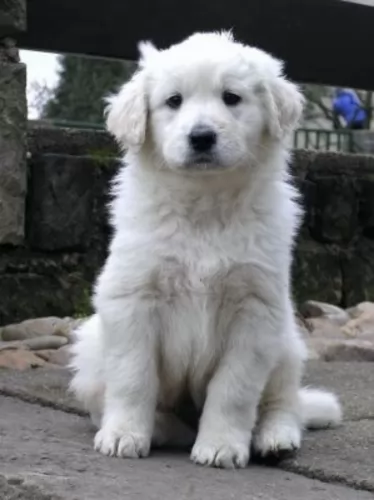 This is a large dog standing at between 59 and 70cm in height and weighing between 31 and 44kg.
This is a large dog standing at between 59 and 70cm in height and weighing between 31 and 44kg.
The neck is broad and has quite a bit of fur around it. The head is large, the eyes dark brown, the double coat is white and thick and medium length. The eyes are brown, the ears medium length and floppy and the tail long and furry.
This is a robust dog, used to spending time outdoors keeping watch over livestock. When he is invited into the home, he is gentle and well behaved, more so when he has been trained and socialized.
He is loving and loyal towards his human family and will get on well with children in the home. He isn’t the brightest dog but you can still have him trained.
 The German Pinscher is a working dog bounding in energy. He just loves being involved with all the activities of his human family.
The German Pinscher is a working dog bounding in energy. He just loves being involved with all the activities of his human family.
He is playful and assertive and will require a firm, balanced owner who is consistent with the rules laid down for the dog. It will be more than worthwhile having him trained and socialized as he becomes obedient, loyal and devoted.
He is intelligent and quick to learn and it simply turns him into a splendid pet. Add him to your family, and you’ll feel as though you’ve added a wonderful dimension to your home.
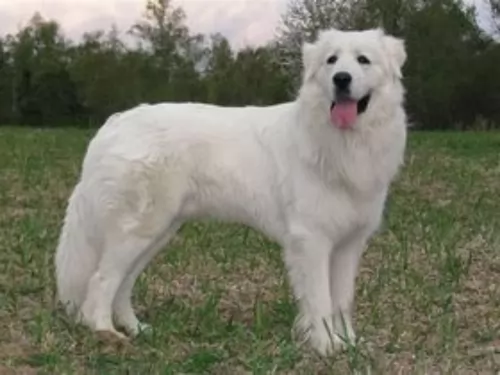 Your playful Slovak Cuvac is an affectionate dog, wanting nothing more than to be totally involved in his family’s life.
Your playful Slovak Cuvac is an affectionate dog, wanting nothing more than to be totally involved in his family’s life.
He is social and loving and also makes an excellent watchdog. He’s a big dog so think carefully before you bring him into your home. Many dog owners like the look of a big dog and forget that it costs a lot of money to feed a big dog and to pay for vet fees.
This big dog is wanting to be part of your family and not just to be discarded when you find that he is costing you too much.
 When you see your German Pinscher standing lean and strong, you can’t think of him ever getting an illness. And yet, even a strong dog like this, who can reach 10 – 14 years of age with good nutrition, can get sick.
When you see your German Pinscher standing lean and strong, you can’t think of him ever getting an illness. And yet, even a strong dog like this, who can reach 10 – 14 years of age with good nutrition, can get sick.
Look out for von Willebrand's blood-clotting disorder as well as heart disease and hip dysplasia with your German Pinscher.
This is a blood disease where there is a deficiency of von Willebrand Factor which results in the blood not clotting properly. The condition can lead to excessive bleeding with your pet after he has had an injury for instance.
You may notice bleeding from the gums, bloody urine or feces as well as bruising of the skin. Get him to the vet who will perform an examination of your pet.
Remember that some health problems seen in a dog are inherited, and if you can get certificates from the breeders proving that the parents have been cleared of hereditary eye diseases, hip dysplasia and blood clotting disease for instance, your dog will have less risks of developing any of these serious conditions.
Also many illnesses can be eliminated by providing your pet with excellent food, clean water, a warm dry place to sleep and lots of love and attention.
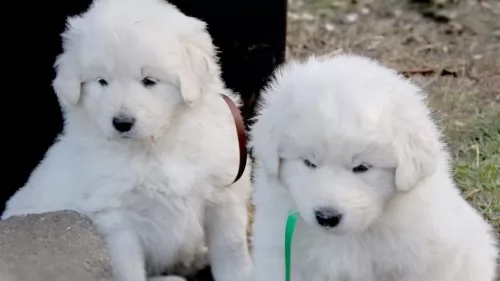 This is a healthy dog breed, but as with many large dogs, hip dysplasia is a threat. Hip dysplasia is always reason for concern as the condition can reduce a dog’s quality of life.
This is a healthy dog breed, but as with many large dogs, hip dysplasia is a threat. Hip dysplasia is always reason for concern as the condition can reduce a dog’s quality of life.
It is distressing seeing your once active pet becoming reluctant to play and move around.
Canine hip dysplasia is a common skeletal condition. It can strike any size dog but is more prevalent with large dogs. The ball and socket of the hip doesn’t fit properly and deterioration sets in resulting in loss of function of the joint.
You will need to get your dog to the vet who will perform a physical exam and discuss treatments to alleviate the pain your dog can experience.
 The German Pinscher, because he is a muscular, energetic dog, should be fed a high-quality dog food that suits his size and his energy levels. If you feed him one of the commercially manufactured dog foods, make sure of the ingredients, as you don’t want food that is full of fillers, colorants and preservatives.
The German Pinscher, because he is a muscular, energetic dog, should be fed a high-quality dog food that suits his size and his energy levels. If you feed him one of the commercially manufactured dog foods, make sure of the ingredients, as you don’t want food that is full of fillers, colorants and preservatives.
Choose high quality foods and sometimes mix in your own home cooked brown rice, vegetables and chicken. Adding in some raw meat occasionally will enhance his health too and help him towards staving off common dog illnesses. He should always have access to fresh, cool water.
He is a high energy dog and will require hectic exercise such as ball- and rope-pulling games, hikes, swimming and walks every day.
His short, smooth coat will require brushing twice a week to remove loose hairs and help it to maintain that sleek, glossy look.
Remember to check his ears for wax and dirt build up as well as for ear hematomas. These swellings inside your dogs ear can also be as a result of something stuck inside your dog’s ear or from your dog scratching his ear because of mites.
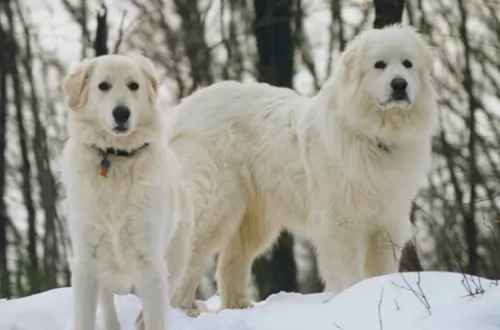 ◆The thick white hair will require regular grooming to keep it free from burrs and dirt. He sheds so this brushing will help him to look more groomed.
◆The thick white hair will require regular grooming to keep it free from burrs and dirt. He sheds so this brushing will help him to look more groomed.
◆The nails should be trimmed regularly and the ears too should be checked for redness and infection. You’ll need to look inside his mouth too as a rotting tooth can cause havoc within his body. A rotten tooth can also cause him tremendous pain and he has no way of telling you this.
◆Have your pet spayed or neutered if you don’t want any puppies. This is better for your dog’s health in the long run too.
◆Your Slovak Cuvac is going to need a lot of exercise as they have always been used to roaming the mountains watching over livestock.
◆This is a big dog so if you buy commercially manufactured food, make sure its for large, energetic dogs. There are good commercially manufactured dog foods on the market – just make sure you buy the best one for your pet to enhance health and longevity.
Try and give him some home made food too. Healthy food which won’t jeopardise his digestion is boiled chicken, brown rice or pasta and spinach, sweet potatoes and carrots. These can all be chopped up and small portions mixed into the dry kibble twice a week as a treat.
Try and include some raw meat occasionally. Your dog will thank you for not giving him exotic people foods which can do lots of harm. Ensure there is always a bowl of fresh, cool water within his reach.